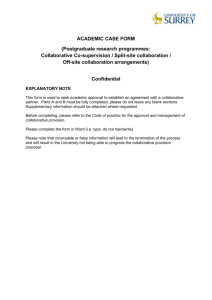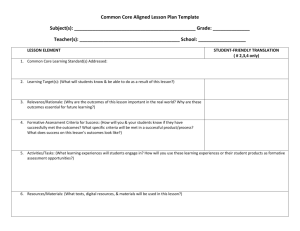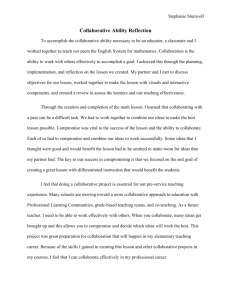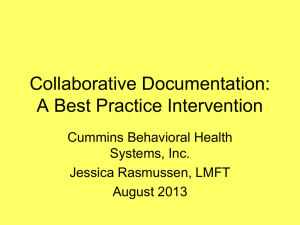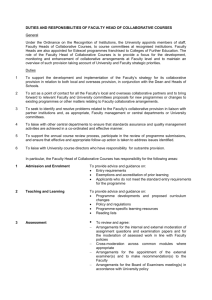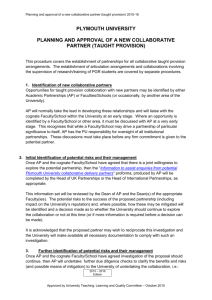Discontinuation procedures for taught provision
advertisement
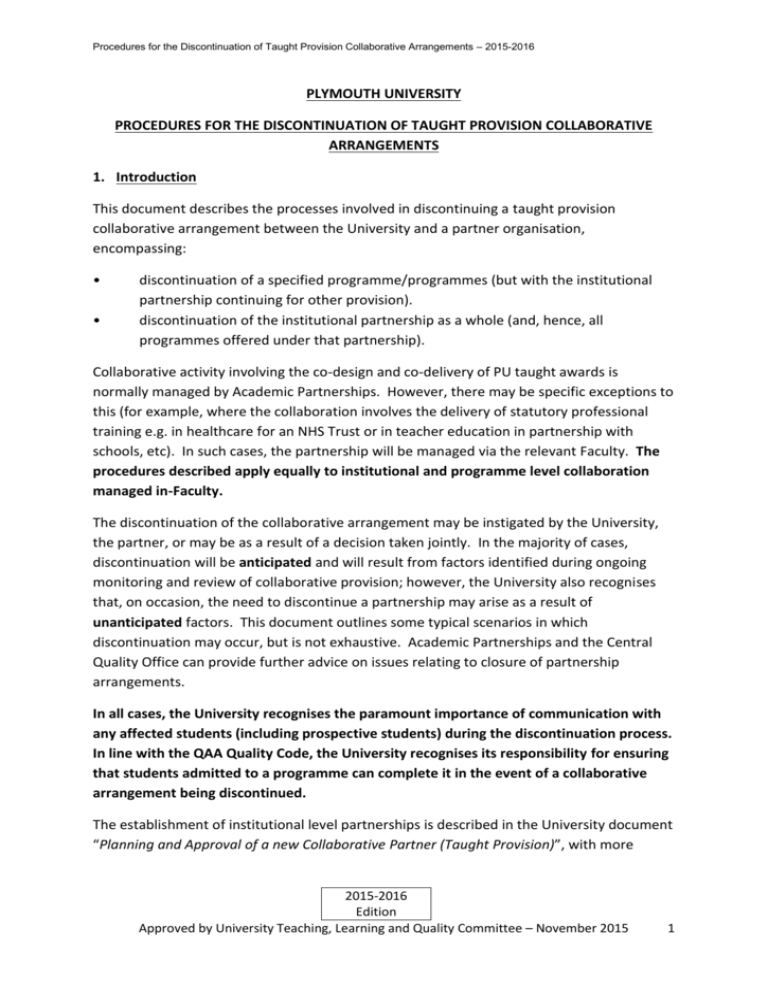
Procedures for the Discontinuation of Taught Provision Collaborative Arrangements – 2015-2016 PLYMOUTH UNIVERSITY PROCEDURES FOR THE DISCONTINUATION OF TAUGHT PROVISION COLLABORATIVE ARRANGEMENTS 1. Introduction This document describes the processes involved in discontinuing a taught provision collaborative arrangement between the University and a partner organisation, encompassing: • • discontinuation of a specified programme/programmes (but with the institutional partnership continuing for other provision). discontinuation of the institutional partnership as a whole (and, hence, all programmes offered under that partnership). Collaborative activity involving the co-design and co-delivery of PU taught awards is normally managed by Academic Partnerships. However, there may be specific exceptions to this (for example, where the collaboration involves the delivery of statutory professional training e.g. in healthcare for an NHS Trust or in teacher education in partnership with schools, etc). In such cases, the partnership will be managed via the relevant Faculty. The procedures described apply equally to institutional and programme level collaboration managed in-Faculty. The discontinuation of the collaborative arrangement may be instigated by the University, the partner, or may be as a result of a decision taken jointly. In the majority of cases, discontinuation will be anticipated and will result from factors identified during ongoing monitoring and review of collaborative provision; however, the University also recognises that, on occasion, the need to discontinue a partnership may arise as a result of unanticipated factors. This document outlines some typical scenarios in which discontinuation may occur, but is not exhaustive. Academic Partnerships and the Central Quality Office can provide further advice on issues relating to closure of partnership arrangements. In all cases, the University recognises the paramount importance of communication with any affected students (including prospective students) during the discontinuation process. In line with the QAA Quality Code, the University recognises its responsibility for ensuring that students admitted to a programme can complete it in the event of a collaborative arrangement being discontinued. The establishment of institutional level partnerships is described in the University document “Planning and Approval of a new Collaborative Partner (Taught Provision)”, with more 2015-2016 Edition Approved by University Teaching, Learning and Quality Committee – November 2015 1 Procedures for the Discontinuation of Taught Provision Collaborative Arrangements – 2015-2016 operational detail being provided in the “Handbook for the Development of new Academic Partnerships”, produced by AP. The formal processes governing the ongoing monitoring of the arrangement at institutional and programme level are given in section 2 below. All institutional level partnerships are covered by a formal agreement (generally known as an Academic Collaborative Agreement), which describes the circumstances under which the agreement may be terminated, either at the instigation of either partner or via mutual decision. 2. Procedures by which potential discontinuation may be identified, discussed and recorded The following are examples of means by which potential discontinuation of collaborative provision may be identified at programme and/or institutional level by the University, the partner, or both (this list is not exhaustive): 2.1. Via ongoing dialogue between the University and the partner: Open, clear and timely communication between the University and partner is critical to the success of the partnership and the early identification of factors which have the potential to trigger discontinuation, thus enabling both parties to work together to protect students' interests. 2.2. Via the ongoing oversight and management of collaborative provision undertaken by Academic Partnerships (or Faculty), including: • Academic Partnerships Board/Faculty Executive • Formal communications /meetings between partner senior managers/owners and senior managers at the University to review the alignment of institutional strategy (these would either pre-empt or follow on from discussions held as part of normal collaborative working) • Establishment and review of risk registers. • Issues raised by student complaints/appeals • Issues drawn to the University's attention by other means (e.g. whistleblowing) 2.3. • • • • • Via formal quality assurance and relationship management processes: Joint Boards of Study/Planning and Review Meetings (for collaborative provision overseen by AP)/regular Faculty and partner meetings. These meetings deal with strategic and operational issues involved in awards and the overall institutional partnership. Annual Programme Monitoring/Review Consideration of proposed major changes to awards Approval of new awards Periodic institutional review (encompassing partner performance evaluation which assesses the ongoing health of the institutional level relationship via a range of due diligence checks): this process will review all a partner’s provision with PU and will consider the need to change, replace or discontinue awards 2015-2016 Edition Approved by University Teaching, Learning and Quality Committee – November 2015 2 Procedures for the Discontinuation of Taught Provision Collaborative Arrangements – 2015-2016 • Review of Academic Cooperation Agreements and other forms of agreement. 2015-2016 Edition Approved by University Teaching, Learning and Quality Committee – November 2015 3 Procedures for the Discontinuation of Taught Provision Collaborative Arrangements – 2015-2016 3. Factors which may result in discontinuation The following are examples of factors which may lead to discontinuation of collaborative provision being considered at programme and/or institutional level by the University, the partner, or both (this list is not exhaustive): • • • • • • • • • • • • • • • Restructuring/portfolio review of partner provision in subject area (including replacement of existing programmes by updated versions). Changes to provision at the University which impact upon partner provision (e.g. changes to progression opportunities, discontinuation of programme at University). Partner’s wish to collaborate with a different awarding body for specified programme(s) or the whole of its provision. Ongoing, unresolved concerns regarding academic quality and standards at programme level and/or across the institution. Financial viability of individual programmes or the partnership as a whole. Risks to reputation involved in continuing the collaboration Divergent institutional strategies Change in Government policy (including that of international governments which impacts on the University's operations in that country) Change in University regulations Change in PSRB requirements Change in ownership of partner Non-compliance with terms of the ACA/partnership agreement Non-engagement/lack of transparency in relationship between University and partner Other factors raised via risk identification and management, public interest disclosure ("whistleblowing"), student complaints, QAA Concerns, etc. Non-recruitment: programmes which have not recruited for 2 years will be automatically discontinued 4. Anticipated Discontinuation In the majority of cases, discontinuation of a programme or partnership will be anticipated in advance and will result from factors identified during ongoing monitoring and review of collaborative provision. a) Programme discontinuation Where only programme-level discontinuation is proposed, with the institutional partnership remaining in force, then Academic Partnerships/Faculty will liaise with the partner to formulate a detailed operational plan via which the closure of the programme will be managed. This will encompass: 2015-2016 Edition Approved by University Teaching, Learning and Quality Committee – November 2015 4 Procedures for the Discontinuation of Taught Provision Collaborative Arrangements – 2015-2016 Completion and submission of a Programme Discontinuation Request Form to ADPC for each programme or group of programmes affected (working through the completion of this form will address a number of the operational details needed to manage closure). Communication with students (by the partner and University if required), confirming that all students on the award(s) can complete their studies and clarifying the implications for progression opportunities. Communication with relevant staff at the university (including programme leads for any progression routes, Head(s) of School, Associate Deans (Teaching and Learning ) of the relevant Faculty) regarding the timescale for the discontinuation, followed by briefing of all those involved in managing and supporting the partnership (e.g. Deans and Heads of Schools with links to the partner, the related Associate Deans for Teaching and Learning, and Academic Liaison) Communication with any relevant professional bodies or other stakeholders Communication with the External Examiner(s) Monitoring progress throughout discontinuation at regular AP Planning and Review meetings/at Faculty level and via Annual Programme Monitoring/Annual Review (which must continue until the programme finally closes). A Project Board will be established by AP if there are a significant number of awards to be discontinued or the situation is complex. b) Institutional partnership discontinuation In addition to the tasks specified under “programme discontinuation” above, if the discontinuation of a whole institutional relationship is proposed, then the operational plan will also include the following tasks: AP SMT/Faculty Executive will be briefed and a decision taken and recorded (e.g. updating of Risk Registers) Dean of AP/Faculty will brief PU UEG Where the whole of an institutional level collaborative partnership is being discontinued, AP or the relevant Faculty will complete the Collaborative Arrangement Discontinuation Request Form AND a Programme Discontinuation Request Form for each programme being discontinued. 5. Unanticipated discontinuation As indicated in section 1 above, there may be rare occasions when previously unanticipated factors require the discontinuation of a programme/partnership to be considered. This will arise when an immediate, serious, evident or potential risk to any of the following is identified: The effective maintenance of award quality and standards at programme or institutional level 2015-2016 Edition Approved by University Teaching, Learning and Quality Committee – November 2015 5 Procedures for the Discontinuation of Taught Provision Collaborative Arrangements – 2015-2016 The delivery of the student experience Failure of institutional delivery of ACA or other agreement requirements Such situations require an immediate response from the University as the awarding body in order to protect students’ interests. The precise nature of each “unanticipated” occurrence will be distinct and will therefore require a bespoke response and action plan to be devised in order to manage the case. This will be the responsibility of the Dean of AP (or Faculty Dean) with initial action taken by the Head of UK or Head of International Partnerships (or Associate Dean (Teaching and Learning)). Key initial steps will include the following (in line with the dispute resolution and termination processes detailed in the Academic Collaboration Agreement/partnership agreement): Making direct contact with the senior managers / key award staff at the partner to clarify the situation Alerting key University academic and professional services staff to the situation, including those with relevant responsibility for quality assurance and the student experience Communicating with affected students and other stakeholders (ideally in liaison with the partner; however the University reserves the right to undertake these communications direct if necessary) After this, the processes described under “Anticipated Discontinuation” above would take place. Depending on the scale, urgency and seriousness of the situation, AP may establish a Project Board. 6. Formal approval of discontinuation Under the University’s Schedule of Delegation, Academic Development and Partnerships Committee considers the discontinuation of collaborative activity on behalf of Academic Board. The University’s Schedule of Delegation states that “Any dissolution deemed to involve high reputational, financial or staff risk (before risk mitigation applied) requires approval from the Board of Governors”. It is therefore the responsibility of ADPC to make this determination and to ensure that, if necessary, the proposal is considered by the Board of Governors before any further action is taken. ADPC may also decide that it requires further information before a decision can be made. The Dean of Academic Partnerships may decide 2015-2016 Edition Approved by University Teaching, Learning and Quality Committee – November 2015 6 Procedures for the Discontinuation of Taught Provision Collaborative Arrangements – 2015-2016 given the scale, nature or risk that it should be referred to the University Executive Group in addition to ADPC. Once the proposal to discontinue has been agreed by ADPC, the Central Quality Office will update the University’s Collaborative Provision Register, clearly indicating the provision that is in the process of being discontinued. It is expected that the Dean of Academic Partnerships will ensure that the dissolution of collaborative provision which is not referred for approval to the Board of Governors will be notified to the Board via the normal University Executive report. 2015-2016 Edition Approved by University Teaching, Learning and Quality Committee – November 2015 7


